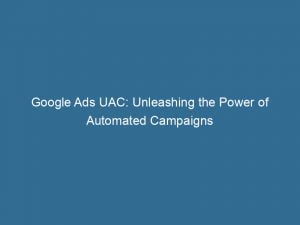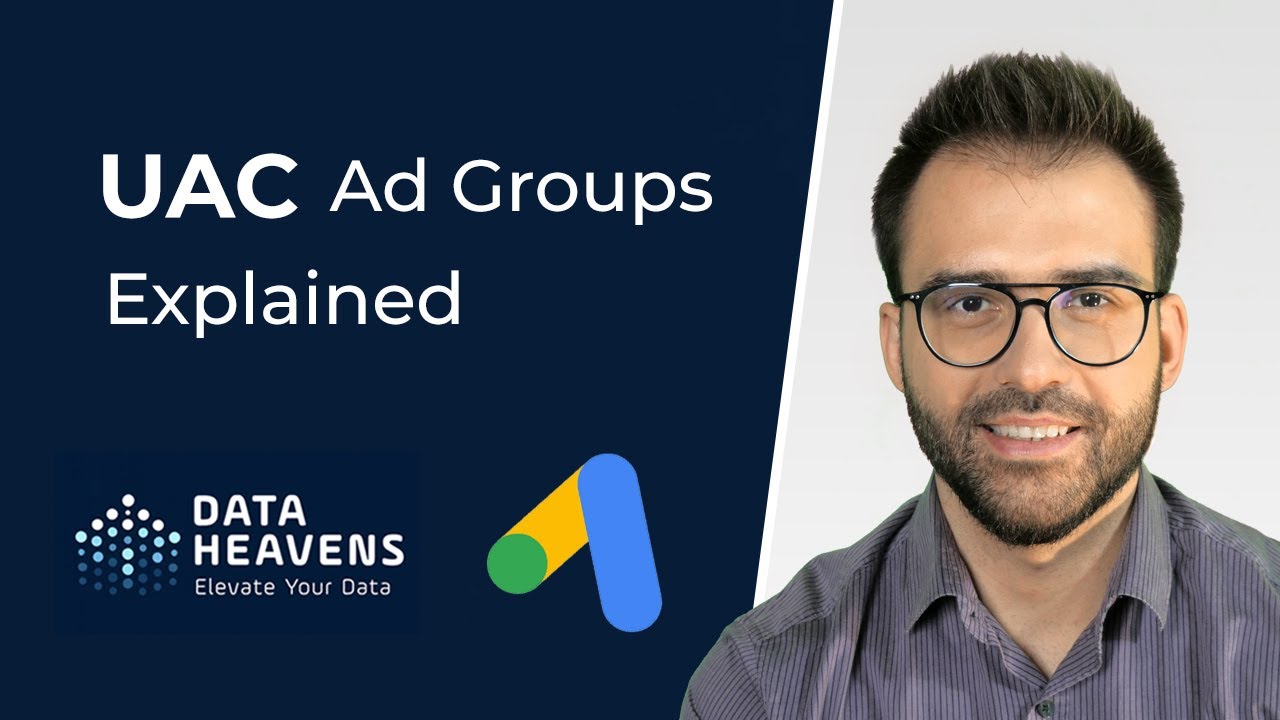- google ads uac
- Introduction: Google Ads Uac – Adwords App Install Campaigns Moving To Uac
- Reaching The Right People: Uac Offers Wide Reach Across Google’s Largest Properties
- Exclusive Ad Placements: Uac Provides Access To Ad Placements In The Google Play Store
- Connecting With Users In Discovery Mode: Uac Connects Advertisers To Users In “Discovery Mode”
- Name Change: Universal App Campaigns Now Called App Campaigns
- No Impact On Features Or Functionality: Change Will Not Affect Campaign Features Or Functionality
- No Action Required For Existing Campaigns: Existing Campaigns Do Not Need Any Action
- Integration With Google Ads: App Campaigns Now Listed Alongside Other Campaign Types In Google Ads
Are you tired of wasting time creating separate ad campaigns for your app installs? Well, Google has come to the rescue with their latest game-changer – Universal App Campaigns (UAC).
Now you can effortlessly target the right audience across Google’s expansive network, including the oh-so-lucrative Google Play Store. But that’s not all!
Google is simplifying things even further by renaming it to “App campaigns,” ensuring that advertisers and developers have no trouble choosing the perfect campaign type. Say goodbye to the old ways and say hello to the future of app promotion!
Keep reading to discover how UAC will transform your advertising game.
| Item | Details |
|---|---|
| Topic | Google Ads UAC: Unleashing the Power of Automated Campaigns |
| Category | Ads |
| Key takeaway | Are you tired of wasting time creating separate ad campaigns for your app installs? Well, Google has come to the rescue with their latest game-changer - Universal App Campaigns (UA |
| Last updated | December 28, 2025 |
ads-uac">google ads uac
Google Ads UAC (Universal App Campaigns) is a feature that allows advertisers to effectively target and reach the right people across Google’s largest properties. This includes exclusive ad placements in the Google Play Store, which helps reach users in “discovery mode.” Previously known as Universal App campaigns, they will now be termed as App campaigns.
The name change aims to make it easier for advertisers and developers to select the appropriate campaign type. Despite the name change, the features and functionality of the campaigns remain unaffected.
Existing campaigns do not require any action, as they will automatically be transitioned to the new term. App campaigns will now be listed alongside other campaign types in Google Ads, providing users with more streamlined campaign organization and management.Key Points:
- Google Ads UAC is a feature that targets and reaches the right people across Google’s properties.
- It includes ad placements in the Google Play Store to reach users in “discovery mode.
- Previously known as Universal App campaigns, it will now be called App campaigns.
- The name change is to help advertisers and developers choose the appropriate campaign type.
- Existing campaigns will automatically transition to the new term, so no action is required.
- App campaigns will be listed with other campaign types for easier organization and management.
Sources
https://www.blog.google/products/ads/universal-app-campaigns-steer-performance-goals/
https://support.google.com/google-ads/answer/9256714?hl=en
https://www.blog.google/products/ads/universal-app-campaigns-optimize-for/
https://www.blog.google/products/ads/universal-app-campaigns-steer/
Check this out:
💡 Pro Tips:
1. Maximize visibility: With UAC, take advantage of exclusive ad placements in the Google Play Store. This can help increase visibility and drive more installations of your app.
2. Target users in discovery mode: UAC is designed to connect advertisers with users who are actively in “discovery mode” – meaning they’re looking for new apps to download. Make sure your app stands out by using engaging ad formats and compelling messaging.
3. Analyze performance: Take advantage of the reporting and analytical tools provided by UAC to track and measure the performance of your app campaigns. This can help you make data-driven decisions to optimize your campaigns and improve results.
4. Optimize for app store optimization (ASO): Since UAC has a strong focus on the Google Play Store, it’s important to optimize your app store listing for maximum visibility and conversions. Pay attention to keywords, app descriptions, ratings, and reviews to improve your app’s ASO.
5. Experiment with different ad formats: UAC offers a variety of ad formats, including text ads, image ads, and video ads. Experiment with different formats to see which ones resonate best with your target audience and drive the highest number of app installations.
Introduction: Google Ads Uac – Adwords App Install Campaigns Moving To Uac
Google Ads is making a significant change to its advertising platform by moving AdWords app install campaigns to Universal App Campaigns (UAC). This shift aims to provide advertisers with a more streamlined and efficient approach to reaching their target audience.
UAC offers a range of benefits, including access to Google’s largest properties, exclusive ad placements in the Google Play Store, and the ability to connect with users in “discovery mode”. In addition, the name of Universal App campaigns will be changed to simply “App campaigns” to better reflect its purpose.
It is important to note that this change will not impact the features or functionality of the campaigns, and no action is required for existing campaigns. Let’s delve deeper into the details of this transition and explore the advantages it offers to advertisers and developers.
Reaching The Right People: Uac Offers Wide Reach Across Google’s Largest Properties
One of the primary advantages of UAC is its ability to help advertisers reach the right people across Google’s largest properties. With this campaign type, advertisers can tap into the expansive reach of Google’s ecosystem, including Google Search, Google Play, YouTube, and various partner websites and apps.
By leveraging these platforms, advertisers can connect with their target audience at various touchpoints and boost the visibility of their app. Whether users are searching for relevant keywords, browsing the Google Play Store, or watching videos on YouTube, UAC ensures that the app is promoted effectively and reaches potential users.
Exclusive Ad Placements: Uac Provides Access To Ad Placements In The Google Play Store
UAC offers an exclusive opportunity for advertisers to showcase their apps in ad placements within the Google Play Store. This feature allows advertisers to reach users who are actively searching for new apps and are more likely to engage with and install them.
By appearing directly within the Google Play Store, advertisers can significantly increase their app’s visibility and attract organic downloads. With UAC, advertisers can take advantage of these premium ad placements to capture the attention of potential users at the right moment and drive higher app installations.
Connecting With Users In Discovery Mode: Uac Connects Advertisers To Users In “Discovery Mode”
UAC enables advertisers to connect with users who are in “discovery mode”. These users may not have a specific app in mind but are open to exploring new options.
By leveraging UAC, advertisers can tap into this audience segment and present their app as a relevant and appealing choice. UAC not only helps in reaching new potential users but also promotes app discovery among an interested audience.
This mode is especially beneficial for advertisers who want to introduce their app to a broader user base and increase its overall reach and engagement.
Name Change: Universal App Campaigns Now Called App Campaigns
To better align with its purpose and simplify the naming convention, Universal App Campaigns will now be called App Campaigns. This name change aims to help advertisers and developers make more informed decisions when choosing the right campaign type for their app marketing strategies.
Although the name is changing, it is important to note that the features and functionality of the campaigns will remain unchanged. Advertisers can continue to leverage the same powerful tools and capabilities offered by App Campaigns to promote their apps effectively.
New name: Universal App Campaigns – App Campaigns
No Impact On Features Or Functionality: Change Will Not Affect Campaign Features Or Functionality
The name change from Universal App Campaigns to App Campaigns will not impact the existing features or functionality of the campaigns. Advertisers can rest assured that they can continue to leverage the same powerful tools and capabilities offered by UAC.
New insights from FroggyAds platform analytics.
The transition solely pertains to the naming convention and aims to provide clarity and simplicity to the campaign types available on Google Ads. Advertisers can continue to run their campaigns seamlessly and expect the same level of performance and effectiveness.
No Action Required For Existing Campaigns: Existing Campaigns Do Not Need Any Action
With the transition of AdWords app install campaigns to UAC, existing campaigns do not require any action from advertisers. These campaigns will continue to run without any interruption or changes.
Advertisers can rest assured that their ongoing campaigns will continue to perform as expected and achieve their desired goals. There is no need to migrate or make any adjustments to the existing campaigns due to this transition.
Integration With Google Ads: App Campaigns Now Listed Alongside Other Campaign Types In Google Ads
Another significant change accompanying the transition of app install campaigns to UAC is the integration of App Campaigns within the Google Ads platform. Previously, app install campaigns were a separate entity, and now they will be listed alongside other campaign types in Google Ads.
This integration enables advertisers to have a consolidated view of their app campaigns and manage them more efficiently. The unified interface ensures a seamless experience and allows advertisers to oversee all their campaigns from a single platform.
In Conclusion,
The transition of AdWords app install campaigns to UAC marks a significant shift in the world of app marketing. With UAC, advertisers gain access to Google’s largest properties, exclusive ad placements in the Google Play Store, and the ability to connect with users in “discovery mode”.
The name change from Universal App Campaigns to App Campaigns aims to simplify campaign selection and provide clarity to advertisers and developers. Importantly, this change does not impact the features or functionality of the campaigns, and existing campaigns require no action.
With integration into the Google Ads platform, advertisers can manage their app campaigns more efficiently and achieve their marketing objectives effectively. Google Ads UAC truly unleashes the power of automated campaigns, empowering advertisers to reach their target audience with greater precision and maximize the success of their app marketing strategies.
Performance Marketing Tips • Native Ad Network • Self-Serve DSP Platform • Programmatic Advertising











